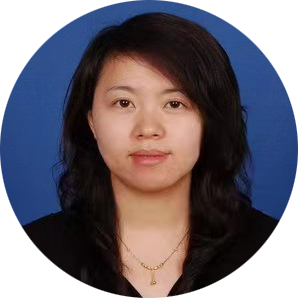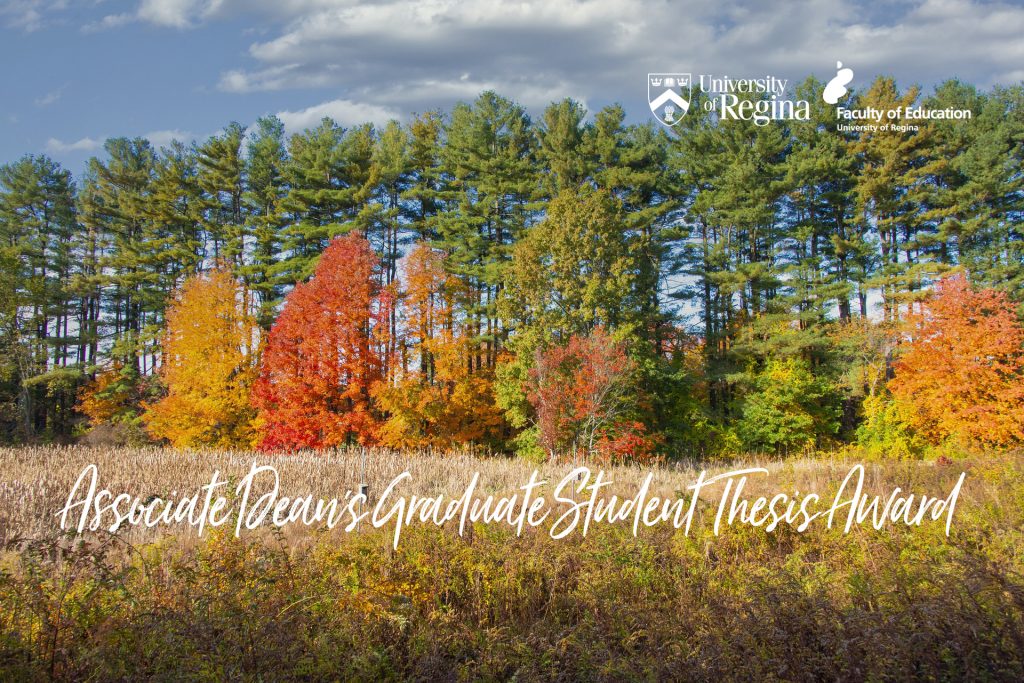
Congratulations to Dr. Yueming Liu, one of two recipients of the fall 2022 Faculty of Education Associate Dean’s Graduate Student Thesis Award. The Faculty of Education Associate Dean’s Graduate Student Thesis Award was established in 2021 to recognize outstanding academic performance of thesis-based graduate students (Masters and PhD) in Education. This $2,000 award is granted to a student in a graduate program in the Faculty of Education who has exemplified academic excellence and research ability, demonstrated leadership ability and/or university/community involvement, and whose thesis/dissertation was deemed meritorious by the Examining Committee.
Dr. Liu successfully defended her dissertation, “Exploring Chinese Instructors’ Perceptions and Practices of Integrating Culture into Tertiary-Level English Education: A Case Study,” on July 15, 2022. Dr. Liu’s supervisors were Dr. Abu Bockarie and Dr. Dongyan Blachford (Dept. of International Languages). Her committee included Dr. Andrea Sterzuk, Dr. Douglas Brown, & Dr. Philip Charrier (Dept. of History). The External Reviewer was Dr. Rahat Zaidi (University of Calgary), and Dr. Chris Oriet (Dept. of Psychology) was chair.
Research story:
Yueming Liu first visited the University of Regina, Faculty of Education as a visiting scholar between 2011 and 2012, sponsored by the China Scholarship Council. The experience influenced her decision to return to the University of Regina for her PhD program in Education. Liu says, “I observed quite a few classes during that year, including Dr. Paul Hart’s methodology, three of Dr. Andrea Sterzuk’s classes related to second language acquisition, and Dr. Douglas Brown’s sociology class and some others. These classes brought me into the academic field and planted a seed in my heart. The emotional bond that I’ve developed with the faculty and the respectable professors brought me back here to do my PhD degree.”
Lui was born and raised in the capital city of a northeastern province in China where she did her undergraduate degree in a Top 20 university, majoring in British and American Literature. After graduating, Liu became an English instructor in the university where she had studied. Because the city is not an international metropolis, Liu says, “Learning about a different language and culture here, like in many other inland cities in China, means that one has limited access to native English speakers and real-life intercultural encounters. Textbooks and the Internet are the primary sites where English learners encounter the target language culture. Addressing the intercultural dynamic is a challenging pedagogical endeavor here when students do not enjoy exposure to real-life culture of English-speaking countries, requiring creativity on the instructors’ part.”
Liu’s interest in her research topic, “Exploring Chinese Instructors’ Perceptions and Practices of Integrating Culture into Tertiary-Level English Education: A Case Study,” was sparked by her own intercultural experiences. She says, “Five years of living and studying in Canada was a transformative journey for me. I was able to be truly involved in communications with people from diverse cultural backgrounds. These experiences caused me to rediscover the complexity of intercultural communication and cultural teaching. I found truth in what Sewell (1999) concluded: Intercultural communication is ‘shot through with willful actions, power relations, struggle, contradiction and change.’ By then, I had started to question the common practice of teaching the generalized culture as bounded by geographic borders. Although a generalized cultural sketch is usually the starting point of one’s journey towards intercultural understanding, it should by no means be the end point. Efforts need to be made to help learners to transcend it. A generalized sum-up of any culture can be incomplete, unfair, destructive, and condescending. A transpired generalized inclination tends to jeopardize, rather than facilitate, intercultural communication. These realizations made me want to see how today’s English instructors in Chinese higher educational institutions conceptualize and approach culture and what efforts they are making to prepare their students for complicated and unpredictable intercultural encounters. As a language instructor myself, I realize how essential it is for us to reflect on and have a clear understanding of our own pedagogical philosophy. Language instructors’ pedagogical conceptualization of culture influences how language learners construct intercultural knowledge, develop intercultural attitudes, adjust intercultural behaviors, and perform intercultural roles.”
Through her research, Liu found that “instructors’ pedagogical conceptualizations of culture significantly influence how language instructors identify cultural points, contextualize culture for pedagogical purposes, and scaffold student meaning-making. The participants conceived culture more as a noun, with its referential meaning ready to be transmitted to the learner in form of objective knowledge, than as a verb (Street, 1991), with its meaning to be explored and interpreted in dynamic social interactions. Further, they perceived culture more as social constraints, in the form of cultural norms that demanded conformity, than as public resources that could be drawn on strategically and creatively to serve purposes. In addition, they viewed culture more as value-free, something that could be grasped at the denotative level, than as value-laden with its barely known face hidden under the veil of cultural myth (Barthes, 1957). This way of conceptualizing culture has limiting effects on classroom meaning-making: the referential, normative (conventionalized), and generalized meaning of culture were highlighted and the personalized, symbolic, and ideological meaning of culture were largely underexplored.”
What impressed Liu most about her findings is that “most participants contextualized culture in self-sanctioned ‘purified’ ways to block off cultural dissonances and there was a general resistance towards problematizing cultural meaning and engaging learners in ‘struggles over meaning.’ I pondered on the possible consequences of portraying smooth cultural landscape and papering over the complexity and ambiguity of culture and how this practice will influence which meanings get inactivated in the classrooms. As I see it, the inadequacy is obvious and profound and this issue deserves more attention from language instructors.”
The research project was memorable for Liu because, she says, it “gave me opportunities to talk to my fellow colleagues, listening to their experiences of teaching culture and observing their practices in the classrooms. This was an exciting and discovering process, during which I reflected on the insights provided by the participants and developed an in-depth understanding of the complexities and challenges involved in culture teaching.”
As recommendations for future research, Liu says, “The meaning-making potentials of the current culture instruction could be expanded through exploring poststructuralist perspectives on culture and reorienting culture pedagogies towards individual-level culture, problematized cultural meanings, and more agentive cultural competence.”
Liu says, “I hope that more practicing language instructors could interrogate their pedagogical philosophy before making attempts to address culture within language classroom. I hope that the inadequacy of tourist-like culture teaching could be widely recognized and dealt with. The increasingly complicated nature of transnational communications poses new challenges for intercultural language education and I hope practicing instructors could take the initiative and seek ways to expand the meaning-making potentials of classroom activities.
Following the completion of her Phd, Liu returned to her university in China to teach undergraduate students English as a foreign Language. “I feel thrilled at the thought of being able to continue working in the field of intercultural language education. I’m looking forward to working with both teachers and students to conduct action research to practice some of my pedagogical ideas concerning culture teaching. Creating opportunities for students to carry out ethnographical project on culture and applying discourse analysis in culture learning, these are but a few possibilities that are waiting for me to try my hands on,” says Liu.
Liu feels grateful for her experiences at the University of Regina, which she says, “helped me to transform from an instructor to a researcher. The classes I observed during 2011 and 2012 led me into the academic world. For the first time, I got to study educational research methodology in a systematic way. I learned how to design and carry out a sound research project. My supervisors, Dr. Abu Bockarie and Dr. Dongyan Blachford guided me in the field of my research area and supported me all the way when I felt overwhelmed by the complexity of culture and culture teaching. I am filled with gratitude for the professors I met here in Regina.”
Follow us on social media